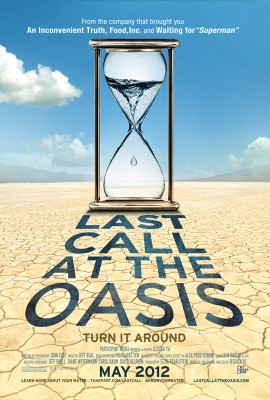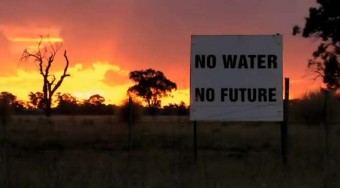Film Reviews

Last Call at the Oasis
Genre: Documentary
Director: Jessica Yu
Cast: Erin Brockovich, Jay Famiglietti, Peter H. Gleick
MPAA-Rating: PG-13
Release Date: May 4th, 2012
Early on in the new film Last Call at the Oasis, ampoule environmental activist Erin Brockovich raises the prospect of a time when water would be considered more valuable than oil. “I think that time is here, healing ” she say. And the film, in many ways, attempts to make that case as the documentary focuses on the importance and debates surrounding water usage in the United States.
Writer/ director Jessia Wu begins her film by focusing on the value of water in our culture and how many use it so liberally unaware or unfazed by how vital that resource truly is. The documentary then focuses on how farmers rely on the substance to make a living and when it is unavailable, they are susceptible to hardships that could not only destroy their businesses but their lives as well.
And in a stunning statistic, Yu notes that at the peak of a recent drought in Australia, “a farmer suicide occurred every four days.”
And people in the United States are not immune to the hardships of a water shortage. In a too-brief passage, the documentary notes how California’s Central Valley suffered drastically when environmentalists fought to preserve a creature known as the delta smelt to the disadvantage of locals whose water supply was cut short due to the efforts to preserve the small creature.
But instead of focusing on the controversial story, the film simply uses it to note that the problem isn’t that the smelt is preventing the valley from receiving the water. The problem is that this problem foreshadows the larger issues we face with a limited water supply is, noting that priorities will need to be chose so that water is used as effectively as possible.
One of the film’s greatest strengths is its usage of data to support its claim how vital water is to our way of life. The documentary notes that a pool can use about 18,000 gallons of water. Not a surprising statistic but an intriguing one. But here are some of the numbers that are truly eye-opening. A four-pound steak also requires 18,000 gallons of water. A glass of wine: 38 gallons. A T-shirt: 700 gallons.
The film’s greatest flaw though isn’t its statistics, which some could likely argue with. The film’s lack of distinct is what unfortunately undermines its efforts. The documentary focuses on a variety of water-related topics– usage, chemical infiltration, bottled water—- but never stops long enough to explicate any of these subjects and create a compelling narrative about them.
During the course of the film, there are also seemingly unnecessary stops along the way when the film hits on obvious targets without delving into details. One is Halliburton, which is criticized midway through the film for a loophole in legislation that exempts oil and gas companies from the Safe Drinking Water Act. Unfortunately, Halliburton is such an oft-seen enemy in pictures like this that the accusations fail to resonate. If only the movie had stopped to discuss the topic in more detail rather than gloss over it so quickly in order to move onto the next order of business.
The Last Call at the Oasis ultimately achieves its purpose in creating an engaging look at how vital and important our water supply is but its lack of focus could hurt its ability to create a real national discussion.
If only the movie had paused long enough to focus on one aspect of the water debate instead of trying to discuss too many issues at once, Last Call could have really served as as an early important call for a talk about this important subject.
Review by: John Hanlon










